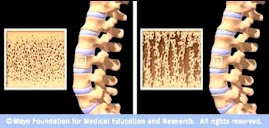WELCOME TO STRONTIUM FOR BONES BLOG
Have you experienced negative, and even dangerous, side effects from Fosamax (alendronate), Boniva (ibandronate), Actonel (risedronate), Reclast (zoledronic acid), Prolia (denosumab), Forteo (teriparatide), Tymlos (abaloparatide), or other drugs prescribed for osteoporosis? If you have, then rest assured there is a safe, effective treatment for this condition. Strontium, primarily in the form of strontium citrate, is taken orally once a day.
Visitors to my blog can leave comments or ask questions and can remain anonymous, if they wish. Their comments are relayed to my g-mail inbox. Below each post, the number of comments for that post is cited and underlined because it is a link. By clicking on that link below any post, a window opens so that a visitor can leave a comment. Ideally, visitors leave comments on posts most relevant to their comments. All comments to my posts are moderated by me.
Browse the posts and visit the link library of references.
How Strontium Builds Bones
Strontium is a mineral that tends to accumulate in bone. Studies have shown that oral doses of strontium are a safe and effective way to prevent and reverse osteoporosis. Doses of 680 mg per day appear to be optimal. See my "For More Information About Strontium" links section.
Osteoporosis is caused by changes in bone production. In healthy young bones there is a constant cycle of new bone growth and bone removal. With age, more bone is removed and less new bone is produced. The bones become less dense and thus more fragile.
Scientists believe that strontium works in two ways. It may stimulate the replication of pre-osteoblasts, leading to an increase in osteoblasts (cells that build bone). Strontium also directly inhibits the activity of osteoclasts (cells that break down bone). The result is stronger bones.
When taking strontium, be sure to take 1200 mg calcium, 1000 IU vitamin D3, and 500 mg magnesium daily. It is best to take strontium late at night on an empty stomach. Calcium and strontium may compete with each other for absorption if taken together.



5 comments:
Contrary to popular belief breastfeeding is protective against osteoporosis.
To Anonymous from 8/16/08:
There is no conclusive proof of your assertion that breastfeeding is protective against osteoporosis. During breastfeeding, 300 to 400 mg of calcium are removed from the mother's body daily. In the majority of healthy women, the temporary loss of calcium from bones is rapidly replenished after breastfeeding is finished.There is typically no effect on the long-term risk of osteoporosis,but there are rare problems. Some women have experienced low bone density and fragility fractures as a consequence of pregnancy or lactation. See Kovacs,Christopher S."Calcium and Bone Metabolism During Pregnancy and Lactation." Journal of Mammary Gland Biology and Neoplasia 10(2005):105-18.
I'm male age 59 and have just been diagnosed with osteoporosis. Came as a bit of a shock as most people regard me as fit if not very fit.
A week before I got the DEXA result I had carried a heavy rucksack for over mile to a crag for a days rock-climbing. I MTB regularly on rough trails and only 5 weeks ago crashed and escaped with a few cuts and bruises.
Like BoneLady I became very worried about the standard treatment over in the UK for men. It seems that it's bsophosphonate or nothing so I decided to go for the Strontium Citrate option.
I have since found that little or no research has been done on men with regards to any form of strontium salt.
It would be could to find out how many men have gone for the Strontium option and are having good results!
If you are interested: I'm off today on my mountain bike down those same rough trails. If I'm going to break a bone may as well enjoy myself doing it!!
Being a recent college grad majoring in BioChem, and having reviewed many papers on current research on Osteoporosis, I would caution Kev and others from swearing off bis-phosphonates with a complete reliance on strontium supplementation.
Increasing evidence supports Sr and Ca both play roles in catabolic and anabolic regulation of bones.
Sufficient Ca and Vit-D are obviously necessary to ensure proper bone growth, and Sr has shown small (but statistically significant) gains over placebos... but to swear off first-line medications like bisphosphonate or promising second line meds like teriparatide (seems to be a parathyroid hormone competator, down-regulating PTH blood secretion, and stimulating osteoblast activity) or SERMs.
Discuss any medication/treatment changes with your physician... even these less effective vitamin suppliments are important to discuss as high stronium levels in bones need to be adjusted for when doing bone density scans.
Response to big: The major human studies of strontium for osteoporosis have involved postmenopausal women and strontium ranelate. Some recent studies have used strontium malonate. The results have been stunning! They showed use of strontium at a dose of 2 grams (680 mg elemental strontium) significantly improved bone density and reduced incidence of all fractures as compared to placebo. Regardless of the form, it is the elemental strontium itself that exerts the positive effect on bone. While all the various forms have a bioavailability of 25 to 30%, gastric tolerance is reportedly better with strontium citrate.
There is a strontium dexa scan effect. If you are taking strontium, the radiologist interpreting your dexa scan needs to know your daily dose and how long you have been taking it. He can then make an adjustment to your results. In the U.S., he may just add a note to your scan results for your physician to interpret. You can read more about this effect at www.osteopenia3.com/Strontium-dexa-scan.html
Post a Comment